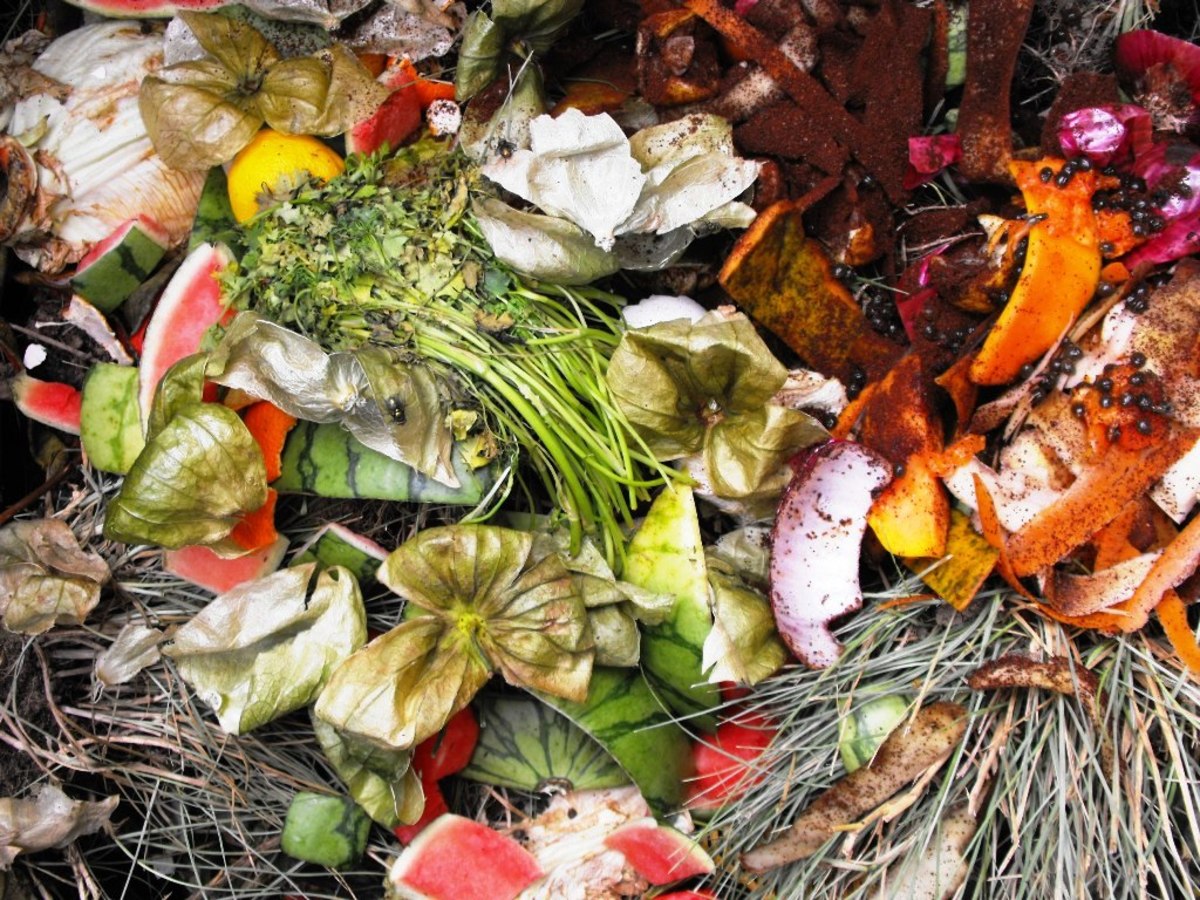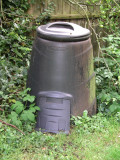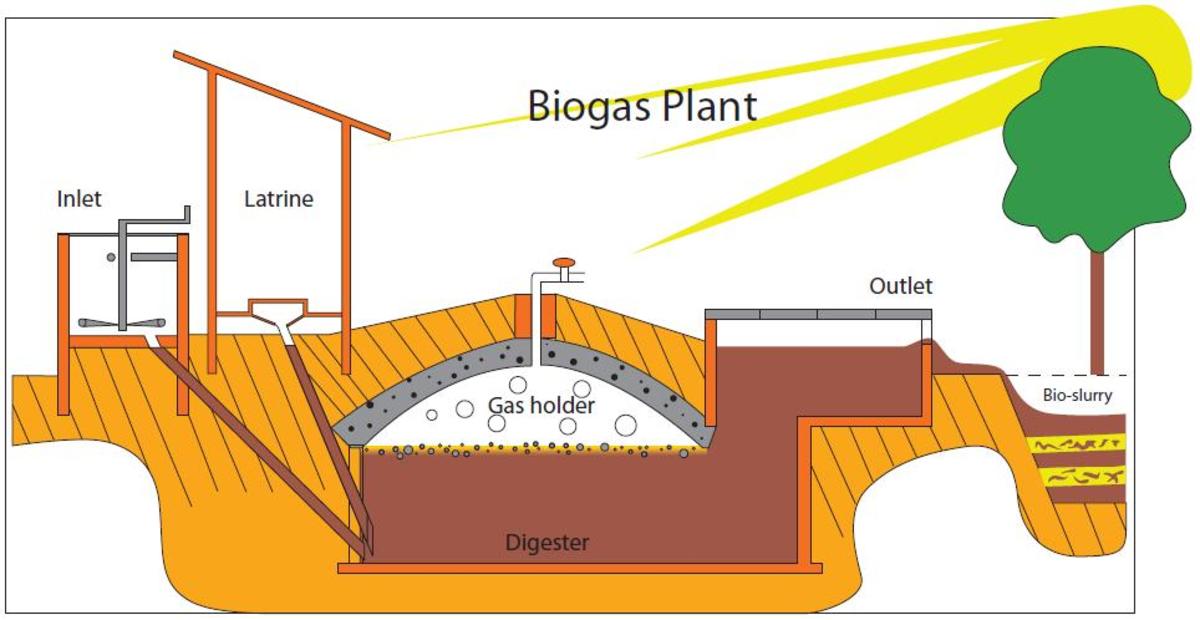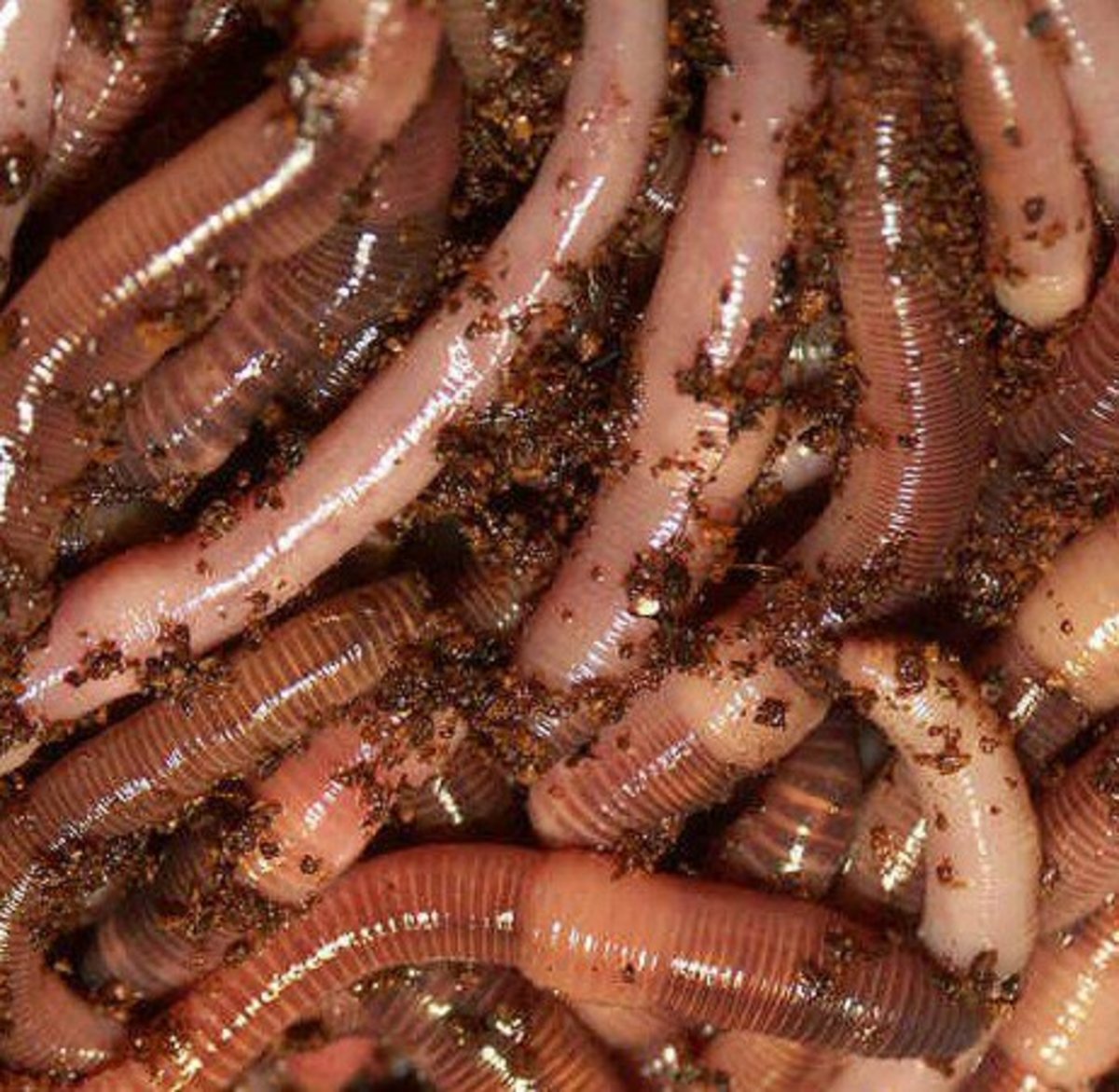What is compost? How do you Make Compost? Everything you need to know about composting
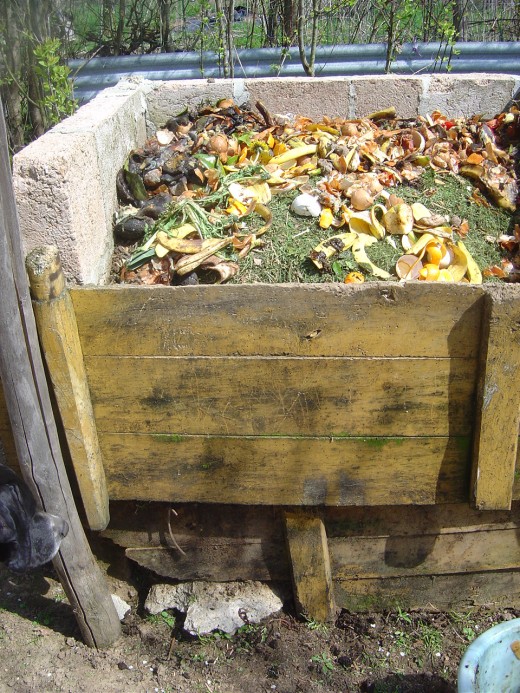
A short guide to the compost heap
What is a compost heap and why should you have one? A compost pile is just a pile of vegetable matter of one kind or another that rots down to provide compost, a material that you add to the soil to improve the soil condition and to feed plants. There are so many reasons to have one. To avoid waste, to feed your garden, as part of organic gardening, as part of your campaign to live a greener life, to help to save the planet, fun, to save money, to put less into landfill sites, to teach children about nature, food and gardening, to get rid of your garden waste easily and efficiently ... I'm sure you can think of more.
Whatever your reasons, compost making is easy and needn't cost very much to become a first class composter. You can read whole books about composting, and to prove it I've included some below, but for those of you who just want to get the job done and not to make a career out of compost, this is the place to start.
Now, you'll find that every body has their own particular recipe for making a compost heap, and it soon becomes dogmatic, so this short, sharp guide is just my way of composting, not the be all and end all, but the Rustic Cook's equivalent in the gardening field.
I hope you enjoy it, have fun with your heap, but most of all, I hope your garden comes up smelling of roses, so to speak.
Image: Our compost heap at Les Trois Chenes Bed and Breakfast, Limousin, France. Contact us on info@lestroischenes.com or check out our web site at www.lestroischenes.com
Build or buy?
You have two choices when it comes to compost bins, build or buy. In the past I've had suburban type gardens and I treated myself to a nice, neat plastic containers like the ones here. They lifted off in sections, looked tidy and were very practical. They worked.
However, if you have a larger garden and so you have both the space for the heap and a large volume of material to compost, then it is best to have a homemade composter, or better still build a series of heaps, at least two. The 'experts' don't recommend that you just pile up your material, although my granny, who had a great garden, used to do just that.
Static or rotating?
Compost rots more quickly if it's turned so someone had the brilliant idea of building a rotating container for compost. They often have a stand, the compost goes into a barrel and the barrel is turned in one direction or another periodically. Again, you can just buy one of these, or you can make one yourself.
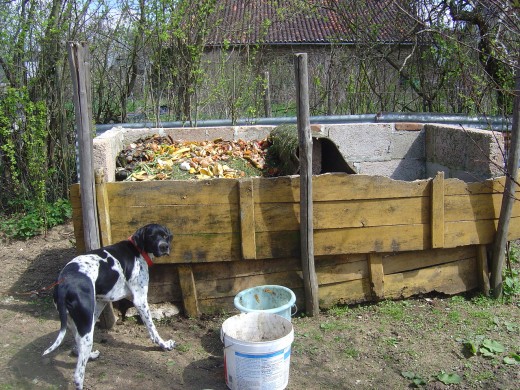
Building your heap
If you decide to build a heap, you can make it out of chicken wire, old palettes, bricks or breeze blocks, any old scrap wood, plastic, woven branches or a mixture of all the above. Wood does rot though as well and I got fed up with having to rebuild them all the time so my husband built these with breeze blocks. Another material you might consider is grass turfs. Pile up the turfs, laid upside down, to form the walls.
Make your heap just a bit bigger than 1 meter cubed, it does have to be quite sturdy and you will need good access at the front so that you can turn it and dig it out. The fronts of mine in the picture are not ideal and since then I've replaced the old shutters with corrugated iron sheets.
Gaps in the wood are good as they introduce air, but they shouldn't be so big that the compost can fall out. Less than c.5cms perhaps.
Where to build it
Choose somewhere that is not too near the house, but not so far away that you won't ever make it there! Put it near the source of your composting material, (at Les Trois Chenes ours is in the hen run so that I can put the cleanings out from the hens onto the heap), or near your vetable garden. Our hen run is next to the veg patch.
Make sure you can get your buckets, wheel barrows up to it and that you have plenty of space around to turn, load and unload your heap.
Do I have to turn it?
No, but if you turn it the compost will be ready much more quickly. No turning, and it might take six months to be ready.
Another advantage of turning is that you ensure the heap rots evenly. Without turning the centre will heat up and destroy the weed seeds and roots, but these might survive on the outside. On my heap the weeds grow on the edges!
I have two heaps so that I can dig out the compost from one, tip it into the next, ie turn it, and then start again with the first one. When the turned compost is ready, I put it onto the garden, and so free the space for my second lot of compost to be put in and so on. All this is heavy work and so it rarely gets done and if you are not up to heavy, manual work I recommend that you think of buying or making a rotating bin. Have a look at one DIY bin below.
While watching this I was wondering, being eminently lazy, whether you couldn't just make one door in a barrel and simply roll it along the ground. How to get it out again? Have a removable top at one end?
How to make your heap
Start the heap with open, coarse material such as twigs, straw and leaves. This is designed to retain the air at the base of the heap.
Then proceed to add your compost material in layers. This is easier said than done because in real life you don't have five heaps of material ready to lay down. I put my buckets of kitchen waste in, then mow the lawn and put the clippings in, then clean out the hens .... but I don't think this really matters too much, providing you don't put too much grass or too much dry material on the heap at once.
Remember to:
- Keep air in your compost
- Keep it moist but not wet
- Keep it covered with old carpet or something similar to keep the heat in and to stop the water leaching out all the nutrients
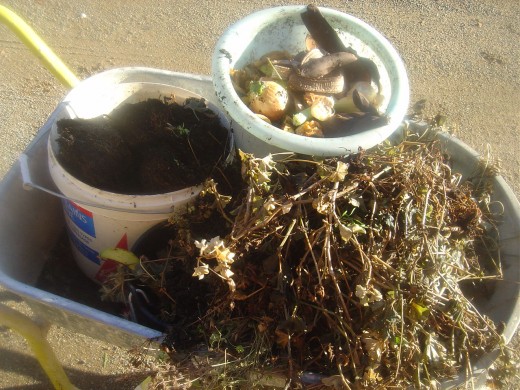
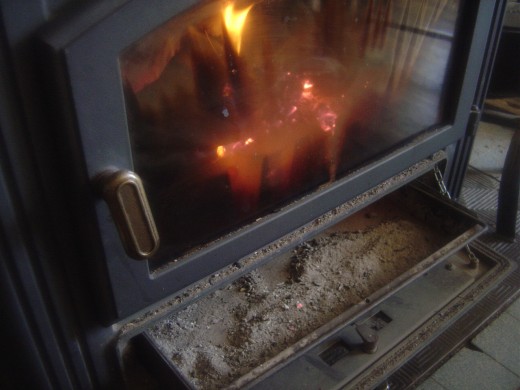
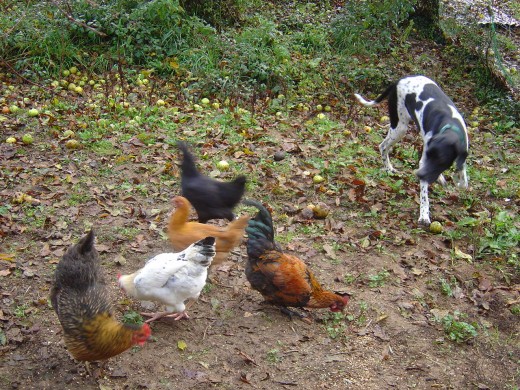
What to put in
As I said above, there are so many opinions as to what should and shouldn't go into a compost heap and everyone has such strong ideas. This is what I put in, but I'd advise you to add as much as possible, so if someone you trust tells you to add an extra ingredient, do it. The more we can compost the better.
- All raw vegetable matter from the kitchen. Vegetable and fruit peelings, trimmings, old veg that you won't eat and can't feed to the dog
- Garden waste. In the picture you can see my frosted geraniums and the soil they were grown in
- Ashes from the bonfire or wood burning stove. This is a great ingredient, rich in potash and excellent for your fruit and vegetables
- You can add what Bob Flowerdew (TV celebrity organic gardener) calls recycled cider
- Horse, donkey, cow, chicken and other herbivore manure. Our hens provide a magical ingredient that is rich in nutrients and speeds up the rotting process
- Garden weeds. There is some discussion as to whether pernicious weeds, the real nasties - perenniels with long, persistant roots, should be included. Perhaps, if you can be bothered, its best to compost the tops but burn the roots. Alternatively, you could make delicious weed soup with them. Weed soup recipe. Nettle soup is a Limousin speciality and is very nutritious as well as tasty, try my Nettle soup recipe here.
- Grass clippings. Care should be taken here though, as the clippings soon heat up and can form an airless layer that can go slimy. Put the clippings straight onto the heap in thin layers of about, say 5 - 10 centimeters.
- Chicken feathers. I was told to do this by the French family who sold us our farm and I totally believe them, so I do this now
- Sawdust and shavings
- Soil is a good starter as it's full of organisms
- Finally, there is a gardening fad to add Comfrey
(In the picture of our hens you can see Molly, our intrepid hunting dog stalking the chickens. This is just one of the many naughty things she's got up to over the years. Have a look at some of her other misdeeds: Naughty Dog Stories From Les Trois Chenes)
Things you might consider putting into your heap
- Pernicious weeds and hope that the heap gets hot enought to kill the roots and seeds
- Waste paper, although I'm not sure about the ink and plastic sorts of paper
- Shredded woody material like shrubs and twigs
- Egg shells – some say yes, others no. I put them into mine
- Some people don't put citrus friut peel in. I know it does take a long time to break down, but I put it into mine
- Wooly jumpers. I've been told to add old woollen clothes, but I don't do this and do wonder if they rot down! Do let me know if you have had any success by leaving a note in the comments box at the bottom of this page.
Things not to put into your heap
- 'Manure' from carnivores - don't put dog and cat excrement in
- Cooked food. This is just my opinion, though. I just don't like the idea and people say that it might attract vermin, but others say you can put in cooked food. First, try not to waste food. Have a look at my waste not want not article Cut your household expenses by 50%. If you really can't eat it yourself, give it to the dog or cat, or the neighbours dog or cat.
- Anything contaminated with chemicals or other undesireable products. Remember, you are going to use this compost on your garden for the plants, and if you grow vegetables, you're going to be eating it, indirectly.
When is it done?
If you turn it regularly and the temperatures are high, during summer, for example, and the heap is the correct size, well constructed with plenty of 'starter' material like chicken dung, then it could take two months. Mine is very slap-dash and take-me-as-you-find-me and takes six months or a year! You'll know when it's ready because it will be a crumbly, sweet-smelling, dark brown material that you wouldn't mind handling at all.
How to manage your compost kitchen to heap
It took a while for me to organise a method of storing and managing the waste from my garden. I am much too lazy to troop down the field with material from each meal. I used to have a compost bucket with a lid in the kitchen, but gave that up, (I won't go into further details!). So now I collect the material in a bowl in the kitchen. When that is full, I put it into a covered bucket outside the kitchen door, then, when the bucket is full I take it down to the heap.
Grow pumpkins in your heap
A good old gardening trick is to plant pumpkins on your well rotted heap. Pumpkins are voracious feeders and just love all that great plant food. Of course, if you decide not to grow them on the heap, be sure to put a good spade full of compost into each hole that you dig to plant your pumpkins! It's easy to grow your own pumpkins.
Turning the compost heap
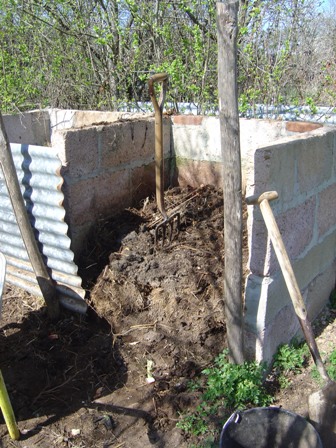
These worms are doing great work in your heap
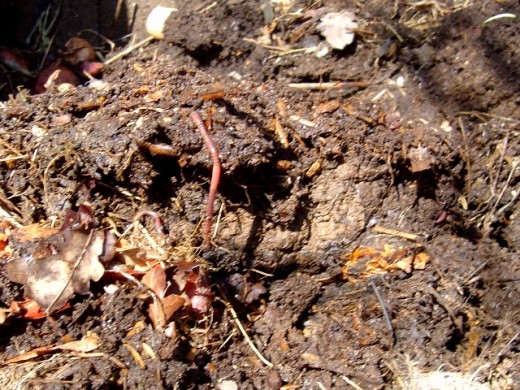
Our gardens at Les Trois Chenes
- Les Trois Chenes B and B and holiday cottage in Limousin, France
Visit our gardens, see our compost heap and taste our produce at Bed and breakfast holiday cottage Limousin France near the Dordogne and Charente. Between Limoges and Angouleme. Near Rochechouart and Saint Junien. We also run painting holidays.
How to find our compost heap!
Painting holidays, Bed and Breakfast, three star holiday cottage
Latest gardening articles by the same author
- The Autumn fruit and vegetable garden
There is much to do in the autumn fruit and vegetable garden. Autumn fruit and vegetables are abundant. Time to make those jams, jellies and chutneys. Gather in the wild food and start planting flowers and vegetables for the coming year. Buy your coo - The Spring Garden
The spring garden is a joy to behold, full of spring bulbs, nodding narcissi, daffodils, tulips, crocus and frangrant lilacs. Bulbs do well in containers. There are many flowers, trees and shrubs that bloom and blossom in spring and this is a tour of - The Romance of the Black Tulip
The romance of the black garden led me to the black tulip. Here I found a path that took me to Alexandre Dumas, to the Impossible Black Tulip Map of ancient China and to the anti-war memorial in Yekaterinburg (also known as Ekaterinburg) Russia. Does




